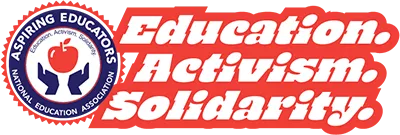Educators at all levels of the profession can recite a long list of why they love teaching K–12 public school students. They’ll also tell you it’s hard. For help and guidance, read NEA’s report, “Great Teaching and Learning: Creating the Culture to Support Professional Excellence.” Brimming with model practices and recommendations from working educators, the report can help sustain and improve your teaching practice.
The publication starts with five essential values that encourage constant learning, professional growth, and respect for each individual. Within these areas, the report gives special attention to aspiring educators and their teacher preparation programs, which are emerging as models to improve educators’ readiness when entering the profession.
The guidance within the report will help you advocate for your profession and help enhance learning for every student. Here are some key takeaways:
Show your passion for learning
Great teachers never stop learning. Throughout your career, your real-world experiences in the classroom will drive your professional growth.
- What you can do: Take opportunities to observe your cooperating teacher and other experienced faculty; to co-teach with other educators; to have colleagues observe your teaching skills; and to have follow-up discussions with colleagues.
Explore assessments for excellence
Assessment should reflect a shared understanding between educators and school staff about what a teacher should know and be able to do, with a focus on teachers’ growth, not ticking boxes.
- What you can do: Find out if your teacher prep programs will provide opportunities to plan for instruction, engage in real-world teaching practice, assess student learning, and reflect on this process. Formative assessment provides feedback on this process to help a teacher learn and improve. It also models how teachers can use real-world projects and feedback to assess their students and help them grow.
Seek a culture of collaboration
Look for a school where teachers collaborate on lesson plans and strategies and then co-teach, observe, and coach their peers. They should work with families, counselors, and other school personnel, as well as school and community partners to better understand and support their students.
- What you can do: Make sure pre-K–12 faculty, school staff, district administrators, and your prep program will work with you during clinical practice. This collaboration will enhance your learning and expand your professional support system to help you address the social, emotional, and academic needs of your students.
Encourage authentic autonomy
As student teachers expand their knowledge and skills, their authority in the classroom should grow, allowing them to make decisions about curriculum design, teaching methods, and assessment strategies.
- What you can do: Through this learning process, you can develop the skills to exercise autonomy in designing culturally responsive lessons that meet the needs of individual students. You can also learn to provide students with autonomy in selecting rich learning experiences to demonstrate their mastery of a subject.
Value people and communities
Ideally, teachers, schools, and districts will partner with the community to ensure that schools are safe, supportive environments, where individuals are valued, and their culture and heritage are respected.
- What you can do: Aim to work in a school where faculty will provide support for you to begin a personal journey of awareness and understanding of your cul- tural lens and implicit biases. This will help you begin a career-long learning process to better understand cultural, economic, and other factors that impact your school community. Additionally, you’ll grow an appreciation of the rich diversity of your school and classrooms, and you’ll develop skills to respond to the challenges and opportunities that come with diversity and inclusion. Finally, you’ll recognize the need for continuous personal reflection and growth and the imperative to advocate for respect and justice for each person in your school community.
For more information, go to nea.org/great-teaching-and-learning-report.
